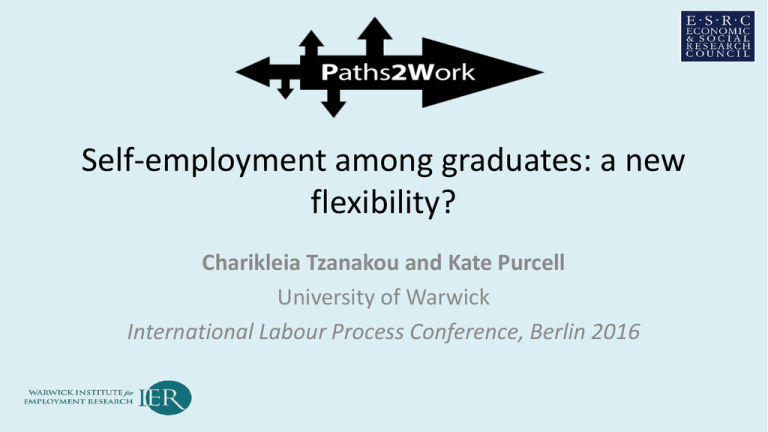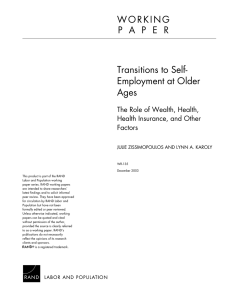Self-employment among graduates: a new flexibility? Charikleia Tzanakou and Kate Purcell
advertisement

Self-employment among graduates: a new flexibility? Charikleia Tzanakou and Kate Purcell University of Warwick International Labour Process Conference, Berlin 2016 Context • One in seven European workers are currently self-employed (Hatfield, 2015) • 45% of Europeans claimed preference for self-employment compared to 49% wanting to work as employees (Eurobarometer) • UK had the third largest rise in self-employment since 2009 • 4.6 million people - 15% of those in work (ONS, 2014) • Growth of self-employment in the UK – labour market recovery • Composition of UK self-employed population change What does this growth indicate? • Increased entrepreneurial activity, potential job creation and economic growth? • Response to Involuntary employment, lack of employment opportunities? • Or increasing precariousness in employment, analogous to the growth in zero hours? Self-employment and graduates • UK government –entrepreneurship initiatives for grads since the 1980s • 1990s ‘Portfolio careers’, AGR (Hawkins, 1995) – ‘graduates should seek clients rather than employers’. • Previous studies of graduates have consistently shown a low proportion being in self-employment (3%) (Elias et al., 1999; Purcell et al., 2005) – recent study shows 5% of grads in 2009/2010 - a significant increase compared to earlier cohorts. What is self-employment? ‘A person is self-employed if they run their business for themselves and take responsibility for its success or failure’ (gov.uk) (-examples among graduates included • Medical and legal practitioners • Management consultants and other business service providers, • Personal service providers • Entrepreneurs selling products/service • Freelance workers, homeworkers, teleworkers, independent contractors • Independent and dependent self-employed workers Research questions • Why did the graduates choose or aspire to be self-employed? • Which factors have affected the incidence of self employment among this generation of graduates? Methodology Mixed methods, drawing on two projects: • Futuretrack - national longitudinal survey for those applied in 2005/06 in FT UG programmes – 4 waves – Using wave 4 data :18-30 months after graduation provided the pool of graduates for the Paths2Work – UK domicile:14,994 graduates • Paths2Work project (ESRC) – precarious pathways of young people in the Midlands – focus on UK domiciled graduates based in the Midlands (applied to HE, studied or worked) Precarious pathways from education to employment for young people Project 2 Year 3 Year 2 Year 1 Project1 Young people’s Pathways into pathways into employmentinfor employment young people in the the Midlands Midlands in the during previous 1930s, 1980s and recessions in the 2000s Midlands in the 1930s and 1980s? Pathways into employment for school and college leavers Project 3 Graduate pathways into employment Project 4 Employers’ perspectives on the recruitment of new labour market entrants Coordination of finding from all the projects: The role of non-standard employment , work experience, unpaid work and internships in the transition from education to employment in the Midlands (and lessons from the past) Paths2Work Interviews • 73 semi-structured interviews: 23 experience of or considered selfemployment • Age group: 25 or under at start of HE studies (so now 28-35) • 14 had experienced self-employment, 9 considered • Range of disciplinary backgrounds: Law, Engineering, Educations, Creative Arts, Archaeology, Philosophy and Interdisciplinary studies such as Languages and Politics etc. • Diversity in occupations: barristers, private tutors, researchers, media communications, independent contractors and setting up businesses in digital design, dog walking or founding a café Push and pull factors for self-employment • Autonomy and greater control of work/life balance • Nature of work and sectoral influences • Earnings • Lack of employment opportunities • Technology - enabler Autonomy and greater control of work/life balance • Autonomy and freedom to choose when, where, how and with whom to work • Flexibility and greater control of work/life balance • Control of the future/career development – fulfilment satisfaction Autonomy and greater control “I think it offers you more freedom, I think you can be your own boss. Effectively, you can dictate your hours, you can dictate where you work, when you work….” [Clare, female, Arts degree, paramedic, considering s/e] • “I think it’s the flexibility that I would enjoy, but also being responsible for your own actions. So obviously, when you’re an agency there’s lots of different people who affect the final outcome, whereas if it was me then I would be ultimately responsible and I think I’d quite enjoy that responsibility [….]. I think seeing the way people are able to set up their own businesses and make them a success has kind of inspired me to want to do it myself”. [Alexandra, female, German and Politics, senior accounts manager, considering s/e] Nature of work and sectoral influences • • • • Lack of flexibility in specific occupations Working unsocial hours, increase in 24/7 working (example) Healthcare/education Self-employment – ‘norm’ in specific occupations e.g. doctors, solicitors, management consultants • Experience for self-employment for professionals in creative arts and design(Ball, 2003) BUT Increasing diversity of occupational groups Sectoral influences “There’s so much interference from the government and so little support from the public at large for teachers… and all of the extra things that we’re asked to do, all of the paperwork, ‘cause it’s moving away from us being a professional in front of a group of children, helping them learn, to [becoming predominantly] target based. You’ve got to get x amount of children to this target or you’re not doing your job, there’s so little consideration of each child being an individual now, even since I qualified. I don’t know if I want to stay doing what is a job that I do actually really enjoy, but I feel that I’m not able to do properly because of all the extra things that we’re asked to do that don’t seem relevant. But because somebody in an office somewhere that has never stepped foot in a classroom says they think we should do it, we have to do it.” [Sally, female, Education, primary school teacher, considering s/e] Earnings • Average earnings differential between self-employed and employees has decreased since 2006 (D’Arcy and Gardiner, 2014). • Push and pull factor – marked differences between earnings as an employee and as self employed “The pay, well, the opportunities for independent contracting will be a huge salary boost […] we’re talking 80, 90% boost…” [Tom, male, Business and IT, employed senior consultant, considering s/e] • High demand for specific skillsets Lack of employment opportunities • Create opportunities for themselves to meet personal circumstances • Access to labour market, work experience and CV building • Competition Create opportunities “While I had to look after my mum and no one would give me a parttime job […] to fit in around the hours in which I needed to look after her, so I set-up, I started dog walking and then it really took off and spending all that time outside, even in like bad weather and still loving it, you know, made me realise actually I do love the outdoors []…So in the end, that’s why I ended up setting up my own business, really, because I needed something that fitted in with mum and also something that wasn’t going to, you know, actually look bad, you know, on, on my CV when I went back into the legal marketplace… [Lynne, female, Law, employed law associate, and s/e] Access to labour market “What seems to be a lot more commonplace nowadays is people being a lot more entrepreneurial, starting their businesses […]I guess that’s kind of, not an easier but a more accessible route into getting work experience. People I know here who have done it, it’s looked upon very, very favourably [by his current employer] saying ‘Hey, I worked for myself and I went out and I got work for clients and I did the work to my own deadlines’, is a lot better than ‘I went and stacked shelves at Asda for nine months’ “. [Tom, male, Business and IT, employed senior consultant, consider s/e] Technology - enabler - Feasibility of working independently Flexible work locations Access to data/information, advisory sources, low start up costs Access to platforms and employment intermediaries High visibility - and ease of access to customers and clients - of successful start up owners and freelancers - Technical abilities Unprecedented change of context for young people in the labour market Networks • Crucial for self-employment irrespective of occupation/industry • Building reputation/establish a profile • Continuous building of networks since school • Proactivity, persistence, openness, willingness to chase up people Challenges • • • • Risks Complementing SE with other work [Often] Crucial importance of support from partners Security and opportunity related to age and lifecycle decisions Conclusions • Increased tendency of graduates to experience and consider self-employment across wide range of occupations • Mix of factors leading to SE: individual and labour market • Pivotal influence of ICT • What explains such a phenomenon? Technical capacities, optimism, expectations about work/life? Response to labour market context changing • Longitudinal monitoring required Thank you Any questions/comments?



